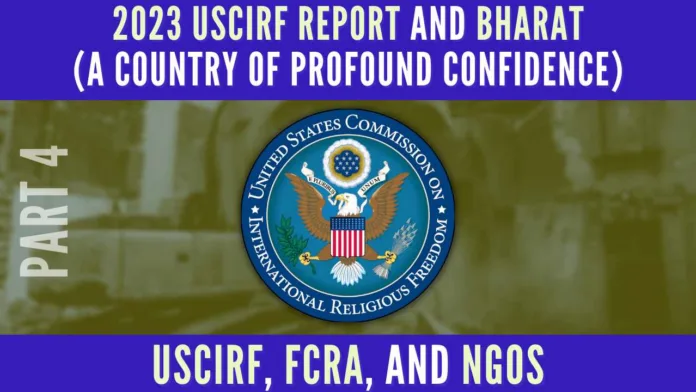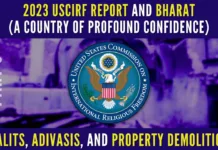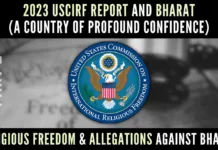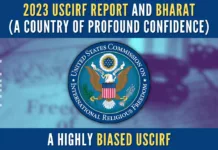
The previous 3 parts of the article can be accessed here Part 1, Part 2, Part 3. This is the fourth part
USCIRF is unhappy with Bharat’s FCRA
We question USCIRF’s motives in its report stating, “targeting non-governmental organizations (NGOs) under the Foreign Contribution Regulation Act (FCRA)?” Why would the politically active Commissioners, mostly Christians, make a statement without any details/ merits?
In the true sense, USCIRF, unduly and immorally monitoring religious freedom in select countries including Bharat, has no connection with, right to comment on, and/ or allege India’s Foreign Contributions Regulations Act (FCRA) in any way or form. The FCRA was enacted and later amended for greater accountability and transparency for Indian NGOs. It was aimed at NGOs receiving foreign funds for improved education, health, and social justice, alleviation of poverty, and combating other societal issues.
In recent years, NGOs have come under the government’s scanner, especially, those with deeply entrenched political connections within and money trail from overseas. They have been in sensational media headlines. We address the question: Why many NGOs lose FCRA registration and what is the USCIRF connection, if any?
We surmise that many NGOs receiving foreign funds have been accused of financial irregularities or political activity for alleged violations of FCRA and thus lost their registration. Who knows if they were engaged in communal disharmony and/ or espousing forceful inter-religious conversions? Were they misusing funds for personal gain, propagation of sedition, and/ or adversely impacting the sovereignty of Bharat?
We wonder if USCIRF is troubled because of the inability of U.S. foundations to transfer funds to NGOs in India to meddle in its internal affairs. The answer is unequivocally yes. Many, if not all, were engaged in prohibited activities. The tightening of FCRA for transparency resulted, according to FCRA Dashboard, 13,584 NGOs losing FCRA for various irregularities or non-compliance and 20,694 deemed expired (as of January 5, 2024). The author, a Trustee of Vidya Gyan India, is keenly aware that an unknown number of NGOs have pending applications for the initial registration. The Ministry is restoring FCRA when the necessary documents are submitted. For example, FCRA for Mother Teresa’s Missionaries of Charity was renewed.
MHA restores FCRA registration for Mother Teresa’s Missionaries of Charity after it submitted the necessary document to concerned department: Govt Sources
Earlier, MHA refused to renew the Mother Teresa-founded NGO’s licence due to some “adverse inputs”.
— ANI (@ANI) January 8, 2022
Why did India cancel thousands of FCRAs?
No country in its right mind wants to stop international collaboration for social services and development for the upliftment of its people. Bharat is no exception until some large foreign funders came under the scanner of FCRA, Enforcement Directorate, Reserve Bank of India, and similar law enforcement and regulatory agencies. The list of such foreign organizations operating in India is too long but let us list a few for illustration.
USCIRF notoriously cited FCRA because the U.S. and other foreign NGOs with deep pockets and political reach, may have complained. These include, for example, Omidyar Network[1], Amnesty International, and Greenpeace shuttering its India operations. Others are Laudes Foundation, Minderoo, Walk Free, Legatum, https://europeanclimate.org/, Children’s Investment Fund Foundation, Human Rights Watch, Compassion International, Oxfam, Centre for Policy Research (CPR), and Open Society Foundation.
The Rajiv Gandhi Foundation, the Rajiv Gandhi Charitable Trust, and the Indira Gandhi Memorial Trust, associated with the Nehru-Gandhi family, have come under the scanner for allegedly “violating the legal provisions of Money Laundering Act, Income Tax Act and Foreign Contribution Act.[2]”
Reportedly, after cancelling Greenpeace FCRA, the government restricted funding for a group of ten American, Australian, and European NGOs dealing with the environment, climate change, and child labor issues. An internal Reserve Bank of India notification was sent to all banks (dated July 1, 2022), to place a number of foreign entities on the “Prior Reference Category” (PRC list).
With the FCRA cancellation of Greenpeace India[3], two NGOs (run by Teesta Setalvad), namely Sabrang Trust and Citizens for Justice and Peace, stood “null and void” for receiving foreign funds. Setalvad is an enthusiastic social activist and a mastermind of many criminal and unlawful activities. Some NGOs have shuttered their India operations, scaled down, and/ or found innovative ways to continue. It is impossible to discuss all NGOs engaged in unlawful activities with a relatively free flow of funding before Modi became Prime Minister in 2014.
Foreign NGOs affecting internal matters
We illustrate a couple of U.S. Foundations like Ford and Rockefeller who may have done some good work. However, their serious interference was in 1975 during Prime Minister Indira Gandhi’s declared “emergency.” These foundations funded “population control” programs that went horrifically awry and labelled “The time of Vasectomy,” a terrible atrocity in India. Clearly, such acts of atrocities do not come to the fore right away and require extensive investigations to bring such organizations to task.
The Ford Foundation also funded Teesta Setalvad who came into the limelight in 2015 with her NGO funding put on hold under the headline, “Ford Foundation Puts $4 Million in Funding to India on Hold[5].”
Teesta Setalvad
Reportedly, the restrictions on a $250,000 grant in 2009 to Setalvad, were imposed. At the time, she was pursuing legal cases against the then-chief minister of Gujarat, Modi. She vigorously accused Modi of failing to stop rioting in Gujarat. The investigators raided Setalvad’s home after a criminal case against her for allegedly misusing the grant. The NGOs were expressly asked to observe more regulatory hurdles and were required to agree that their work will not be “detrimental to the national interest.” This step was deemed necessary to protect Bharat’s sovereignty from silent actors like Teesta and her funding partners like the Ford Foundation.
We were equally stuck that Setalvad’s name is among the list of 55 Indian perpetrators maintained by USCIRF. In the court papers, she has been charged with premeditation and conspiracy fabricating and destroying evidence, filing a false police report, and forgery. While she was granted bail earlier, she was in court this month again for another alleged crime of her involvement in a mass grave digging linked to the 2002 riots in Gujarat. The judge stated that he is “not inclined” to grant her relief[6].
In conclusion, most international NGOs have a well-crafted mission and vision but it cannot be overlooked that many wish to exert undue influence. The contemporary Bharat deserves a changed behavior and less interference in its internal affairs.
It is unfortunate that USCRIF is shifting from its core objectives as an anti-India lobbying agency with irresponsible mention of FCRA. USCIRF is agitated that the tightened FCRA is not allowing the puppet Christian organizations the free flow of funds for religious conversion and/ or communal disharmony.
USCIRF truly has no connection/ business with FCRA. It is equally unfortunate that USCIRF is unable to stomach Bharat’s continued cultural and religious renaissance as well as its development.
Note:
1. Text in Blue points to additional data on the topic.
2. The views expressed here are those of the author and do not necessarily represent or reflect the views of PGurus.
Reference:
[1] Omidyar Network pulls out of India – Dec 12, 2023, TechCrunch
[2] All about 3 Gandhi family-linked trusts being probed by govt for ‘financial irregularities’ – Jul 08, 2020, The Print
[3] Greenpeace India’s registration cancelled – Mar 28, 2016, The Hindu
[4] “The time of vasectomy”: how American foundations fueled a terrible atrocity in India – Jun 05, 2019, Vox
[5] Ford Foundation Puts $4 Million in Funding to India on Hold – Jul 17, 2015, Philanthropy News Digest
[6] “Not Inclined”: High Court On Relief To Teesta Setalvad In Grave Digging Case – Jan 02, 2024, NDTV
For all the latest updates, download PGurus App.
- Education and election in Bharat: Race to the top - April 16, 2024
- Kejriwal: “An Insignificant Man” or a corrupt politician with impending prison term - March 24, 2024
- Bharat’s general elections and the Model Code of Conduct - March 22, 2024










